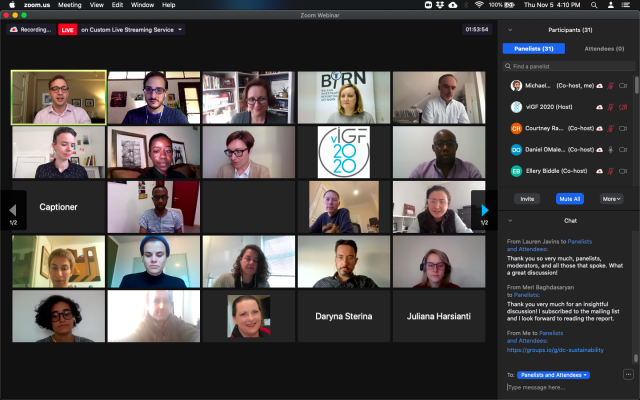Session
Round Table - U-shape - 90 Min
This session will constitute our annual meeting to update the DC-Sustainability members on important developments since we launched at IGF 2019. It will also provide space to present the outcome of our 2020 action plan, which we devised in December 2019 and January 2020. Over the course of 2020, we are working to publish an edited volume that gathers case studies (“chapters”) highlighting the different ways digital policies (and the lack of journalistic/media input) impact media sustainability. All dynamic coalition members (individuals and/or organizations) have been encouraged to contribute to addressing some of the key issues that were identified at our meeting at IGF 2019 in Berlin that range from issues related to content and digital platforms, to governance, policy, and regulation. The goal is to have a diverse compilation of concrete examples and case studies that are easily understandable to other Internet governance stakeholders, and that can then advise our 2021 action plan. The session itself will highlight some of these stories, offering a platform for the authors to share and expand on their experiences, while also addressing media sustainability in the digital age at a time of crisis. Already, the COVID-19 pandemic and the ensuing economic fallout, journalism and news media have never been more vulnerable (see, for instance: https://reutersinstitute.politics.ox.ac.uk/risj-review/what-will-coronavirus-pandemic-mean-business-news). Furthermore, journalists and the news media industry as a whole face unprecedented threats in the changing information environment — economic and market challenges, increasing distrust and denigration of their work, and new forms of digital repression — that are often overlooked in today’s regulatory conversations. Especially now with the perfect storm of disinformation, market destabilization, digital repression of critical voices, and the disruption of our daily lives caused by the COVID-19 crisis, the situation facing journalism and news media is dire (see: https://medium.com/global-network-initiative-collection/threats-to-media-sustainability-and-freedom-of-expression-in-the-digital-era-by-michael-j-41fab4d8664a). Thus, our session will explore what stakeholders within the Internet governance ecosystem can do to support journalism and news media sustainability in these unprecedented times.
The sustainability of journalism and news media in the digital age is intrinsically linked to the policies that governments, the private sector, and other actors enact – or fail to enact – to govern the Internet and digital technologies. It is therefore impossible to address the mounting challenges that the sector face without dialogue and meaningful engagement both within the wider journalism and news media sector, but particularly outside of it. By bringing these concerns to the IGF and engaging in a multi-stakeholder discussion, we aim to bridge existing gaps between our community, policymakers, and the private sector.
One of the DC-Sustainability's principal positions relates to the lack of inclusion of the wider journalism and media sector within digital policy discussions. This exclusion has led to the current environment where such policies inherently impact the sector’s sustainability, yet do not include journalists and news media practitioners or their important voices.
Courtney Radsch – Committee to Protect Journalists (CPJ)
Daniel O’Maley – Center for International Media Assistance (CIMA)
Hesbon Owilla – Aga Khan University, Kenya
Mira Milosevic – Global Forum for Media Development (GFMD)
Michael J. Oghia – Global Forum for Media Development (GFMD)
Tanja Maksic, BIRN Serbia
Fiona Nzingo, RNW, Love Matters Kenya Social Media Director
Ellery Biddle, Ranking Digital Rights
Olaf Steenfadt, Reporters Without Borders
Michael J. Oghia and Mira Milosevic, Global Forum for Media Development
GOAL 16: Peace, Justice and Strong Institutions
Report
- There was broad support for the view that problems of media sustainability are interconnected with the ecosystem of Internet governance.
- It was agreed that sustainable funding and business models for media must be achieved together with different stakeholders within the IGF ecosystem.
- Legal obligations and policy regulation were seen as needed in order to guarantee data protection, non-violation of human rights, and access to independent media.
- More transparency for content regulation on Internet platforms regarding sensitive content of human rights activists, journalists, and critical voices across markets and states.
- Robust tech policies are needed to guarantee independent journalism and access to information, while there needs to be greater consideration and respect for smaller markets by technology platforms.
- The COVID-19 pandemic reveals what was evident even before: Global Internet governance has a direct and significant impact on media sustainability.
Tanja Maksic, BIRN Serbia, female
Fiona Nzingo, RNW, Love Matters Kenya Social Media Director, female
Ellery Biddle, Ranking Digital Rights, female
Olaf Steenfadt, Reporters Without Borders, male
Michael J. Oghia, Global Forum for Media Development, male
Mira Milosevic, GFMD, female
It was mentioned that content removal from social media platforms can have negative gender implications especially in the context of online campaigns for health and sexual reproduction issues.
